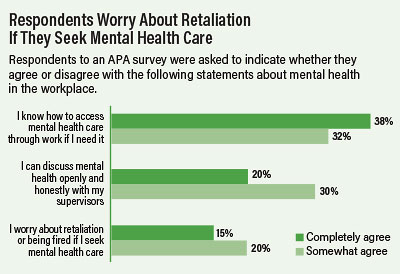Mental Health Stigma Persists in the Workplace, Poll Shows
Abstract
More work to decrease stigma is needed to make people feel comfortable about sharing their mental health issues in the workplace.
Only about half of American workers said they are comfortable talking about their mental health in the workplace, and more than one-third expressed concern about job consequences if they sought out mental health care, according to the results of a survey released by APA at its 2019 Annual Meeting last month in San Francisco.

While most workers with benefits said they know how to access mental health services (70%) and are at least somewhat comfortable accessing services (62%) through their employer if needed, more than 25% of workers reported uncertainty regarding how to access mental health care through their employer.
The stigma of mental illness is still a major issue in the workplace, according to the survey findings. Just over half of workers said they are at least somewhat comfortable discussing mental health openly with co-workers and supervisors; however, only 20% said they are completely comfortable. Younger workers were much more likely to feel they could discuss their mental health at work—millennials were almost twice as likely as baby boomers to be comfortable (62% versus 32%).
Thirty-five percent of respondents completely or somewhat agreed with the following statement: “I worry about retaliation or being fired if I seek mental health care.” Looking at age and gender, younger men were more likely to be concerned than older men or than women of any age about retaliation.
Most workers said they would recognize signs of distress in co-workers and would reach out to help. Seventy-six percent of respondents said they are very likely to recognize signs of anxiety, depression, or other mental illness among co-workers; and 54% said they would reach out to fellow workers in need of mental health care. But 24% said they would not know where to guide a co-worker for mental health help.
“These results show both encouraging and concerning aspects of mental health in the workplace,” said APA President Altha Stewart, M.D. “The extent to which people are willing to reach out and help colleagues is encouraging. However, the continued hesitancy among many to talk about mental health concerns in the workplace is troubling. We have work to do to get to the point where people are as comfortable talking about mental health concerns as they are about physical health concerns,” she said.
The vast majority of workers said their employers offer some type of mental health resources, such as an employee assistance program, mental health days, wellness programs, or on-site mental health services. While many workers (60%) agreed their employer is providing sufficient mental health coverage, 27% said their employer does not offer sufficient coverage.
These findings are from an APA-sponsored poll conducted online using ORC International’s CARAVAN Omnibus Survey. The surveys were collected from a nationally representative sample of 1,005 adults aged 18 years and older from April 4 to 7, 2019, and from similar polls of about 1,000 adults in March 2018 and April 2017. The margin of error is ±3.1 percentage points. ■
More information about the poll can be accessed here.



